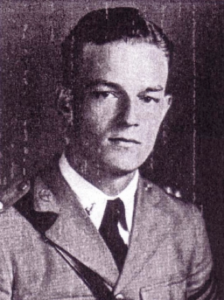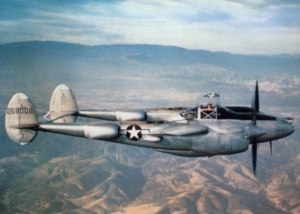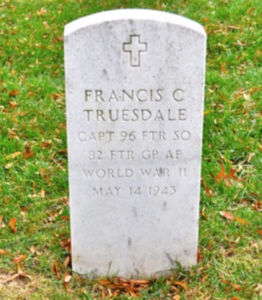Scroll of Honor – Francis Carlton Truesdale
The First Victory
The Great Depression had blanketed the country in misery, yet  some lucky, disciplined and intelligent young men still managed to pursue their educations.
some lucky, disciplined and intelligent young men still managed to pursue their educations.
Francis Carlton Truesdale of Kershaw entered Clemson in the late summer of 1930. While he was attending Clemson, unemployment peaked at more than twenty percent and economic output plummeted. In short, the country—along with much of the rest of the world—was experiencing an economic shock which would reverberate through the rest of Truesdale’s life. An agricultural chemistry major, Truesdale was an Alpha Zeta Scholarship recipient and was selected for membership in Tiger Brotherhood. As a member of the Junior Platoon, competing in competition at ROTC Camp held on campus in the summer of 1933, Truesdale and his comrades captured the championship of the Fourth Corps Area drill competition.
The seeds of Adolf Hitler’s rise to power were sown during Truesdale’s time on the Clemson campus, when economic calamity and the oppressive terms of the Versailles Treaty which had ended the Great War combined to create political and social instability in Germany. Truesdale would soon be called to meet the threat posed by Hitler and his henchmen.
After the war ensnared the United States, Truesdale earned his pilot’s wings in May 1942 at Brooks Field, near San Antonio, Texas. He was assigned to the 96th Fighter Squadron  which was equipped with the new P-38 Lightning, one of the era’s more distinctive aircraft due to its twin-boom design. The 96th deployed to Northern Ireland in the fall of 1942 to continue training for battle as part of the Eighth Air Force. A month after the invasion of North Africa, the 96th deployed to Algeria and entered combat as an element of the Twelfth Air Force.
which was equipped with the new P-38 Lightning, one of the era’s more distinctive aircraft due to its twin-boom design. The 96th deployed to Northern Ireland in the fall of 1942 to continue training for battle as part of the Eighth Air Force. A month after the invasion of North Africa, the 96th deployed to Algeria and entered combat as an element of the Twelfth Air Force.
Truesdale and his squadron mates flew antisubmarine patrols over the Mediterranean coast of North Africa, escorted Allied bombers and attacked enemy shipping and airfields. As Allied ground forces advanced against the German and Italian defenders, the 96th moved its air bases eastward through Algeria and Tunisia. With the final Allied ground offensive underway in late April 1943, the squadron began attacking targets in Italy, earning a Distinguished Unit Citation for an attack on enemy airfields at Foggia.
On May 6, British troops captured Tunis and American forces captured Bizerte. A week later, all Axis troops in Tunisia, about 240,000, surrendered. The following day, on an unspecified mission, Captain Francis Carlton Truesdale was reported as missing in action. German authorities later confirmed through the International Red Cross that he had been killed. On May 15, British Admiral Andrew Cunningham announced that “the passage through Mediterranean was clear” enabling the resumption of vital supply convoys through Gibraltar to Egypt.
Captain Truesdale’s sacrifice had helped the Allies achieve their first victory over the Germans and paved the way for the long, advance to Berlin.
Captain Francis Carlton Truesdale was survived by his widow, the  former Catherine Poole of San Antonio and their four-month-old son Francis Carlton Truesdale, Jr. He was also survived by his parents, three sisters and three brothers, one of whom was in the Merchant Marine and another, Lieutenant Colonel E. V. Truesdale who had just returned from the Pacific Theater. Captain Truesdale is buried in Arlington National Cemetery.
former Catherine Poole of San Antonio and their four-month-old son Francis Carlton Truesdale, Jr. He was also survived by his parents, three sisters and three brothers, one of whom was in the Merchant Marine and another, Lieutenant Colonel E. V. Truesdale who had just returned from the Pacific Theater. Captain Truesdale is buried in Arlington National Cemetery.
For more information on Captain Francis Carlton Truesdale see:
https://soh.alumni.clemson.edu/scroll/francis-carlton-truesdale/
For additional information about Clemson University’s Scroll of Honor visit:
